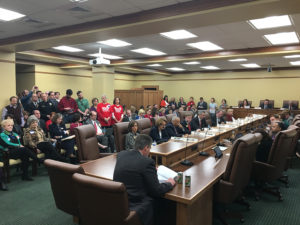By Steve Brawner
© 2017 by Steve Brawner Communications, Inc.
Arkansas’ attempt to execute eight inmates in 11 days has led to a lot of discussion about whether the death penalty should continue to exist, and that discussion should continue. But given that polls show a strong majority of Arkansans support it and the governor is ready to enforce it, the more immediate discussion should be about how to administer it far better than it is has this month.
As you and a lot of people in the United States and the world know, Arkansas’ plan would have set a recent record for most executions in the least amount of time. This was done because the inmates had reached an end point in the appeals process at the same time the state’s supply of one of its three death penalty drugs, midazolam, was about to expire at the end of April. The drugs are hard to obtain because the manufacturers didn’t make them to be used in executions and don’t want to sell them for that purpose, in part because it gets them in trouble with the European Union, a much more important client than Arkansas.
Gov. Asa Hutchinson, a lawyer by training, knew the schedule would result in a flurry of lawsuits and disruptions and that probably not all eight executions would be carried out. (Three have happened and a fourth looks likely, but the rest probably won’t occur before the end of April.) He knew this would be a difficult time for everyone concerned, including his own administration, whose attention this has dominated. But the need to complete the process before April 30 apparently overshadowed how it would affect the state’s brand, which is surprising, because his concern for that brand was the main reason legislators never even seriously considered a transgender bathroom bill during the past three months.
Worldwide, the story is not that Arkansas is executing eight people. The story is the rapid pace, and reason for it. At the moment, many outsiders would fill in the blank in the following sentence “Arkansas is _____,” with “the state that planned to execute eight people in 11 days because one of its drugs was about to go bad.” Regardless of what you believe about the death penalty, if that’s the first thing that pops into an outsider’s head, it’s not good for business.
Also not good for business are the unprofessional methods Arkansas has used to obtain its three-drug cocktail: the sedative midazolam; vecuronium bromide, which stops a person’s breathing; and the heart-stopping potassium chloride. As reported by the Associated Press, the Department of Correction director obtained potassium chloride against the wishes of the manufacturer by meeting in an undisclosed location with a distributor who “donated” it rather than sell it. Moreover, the manufacturer of vecuronium bromide sued the state saying it had been misled about how the drug would be used, though a Department of Correction deputy director said he did give that information to a company salesman.
The lack of straightforwardness by one party in these transactions – Arkansas – is possible because a state law keeps anonymous the identities of drug manufacturers and suppliers, which is looking more and more like a bad idea. The rule of thumb should be, open government is better than a secretive one, lest agency directors sneak around the corner to obtain drugs from undisclosed suppliers.
Governments have been executing people for eons using a variety of methods, from hangings to guillotines to feeding them to lions. Despite there being thousands of ways to kill a person, Arkansas state law very specifically requires using either a barbiturate or that three-drug cocktail, all of which are difficult to obtain, or if lethal injection is invalidated by a court, the electric chair.
Legislators met for three months this year, but the state’s execution processes where hardly discussed despite the gathering storm. They will meet three more days in a special session May 1-3, but there’s no talk about changing the processes then, either.
Regardless of what one believes about the death penalty, we can all agree that this has been a roller coaster ride for everyone, and not a fun one. Much of that is because of an American legal system that Arkansas can’t change, but it can change its own laws and administrative processes. It should do what it can as soon as it can. There are still 30 inmates on Death Row, with more to be added later.
